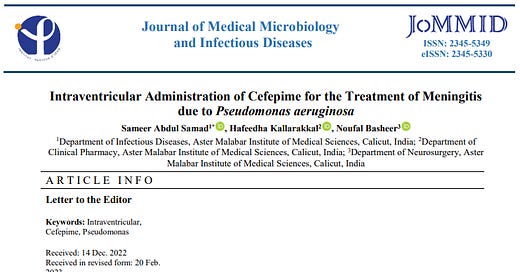Beta lactam antibiotics are traditionally not given via the intrathecal or intraventricular route because their target concentrations in the central nervous system can usually be achieved with a higher intravenous dose. The flip side of using high doses of beta lactam antibiotics is that they may cause encephalopathy and seizures. Pseudomonas aeruginosa isolates which are resistant to carbapenems can still remain susceptible to the fourth generation cephalosporin, Cefepime. This is because overexpression of efflux pumps and porin loss are major mechanisms of antibiotic resistance in Pseudomonas.
We wrote a letter to the editor of the Journal of medical microbiology and infectious diseases about a case of nosocomial meningitis and pneumonia caused by carbapenem resistant Pseudomonas aeruginosa where Cefepime was successfully administered via the intraventricular route leading to microbiological clearance. Read the full article by clicking here.






